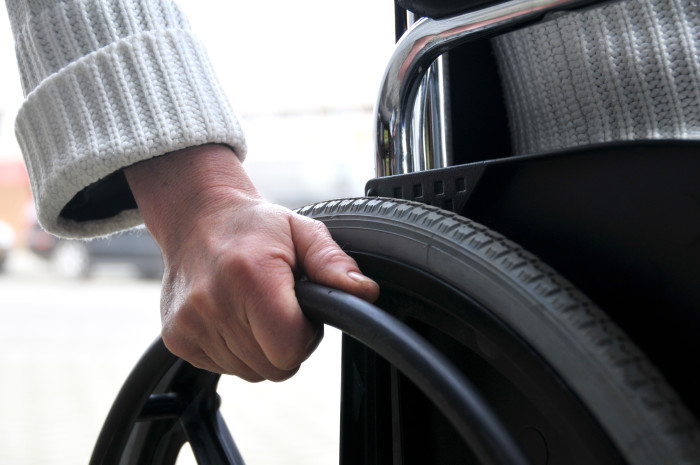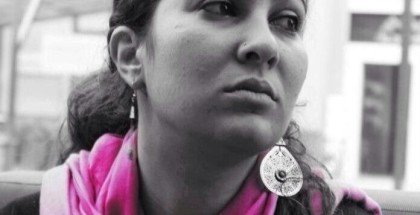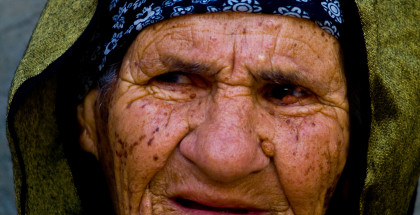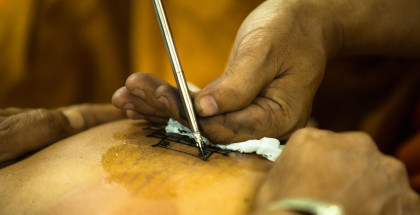The Inaccessible Egypt
October 12, 2014 | Nadine El SayedLiterally jumping on the barely-stopping microbus, getting by the streets of busy Tahrir Square, crossing its streets to Mogamaa’ and trying to get the simplest paperwork done is a challenge by itself.
But when the task has to be done without sight, or with any physical disability for that matters, it becomes slightly more complicated.
The number of people with physical disabilities, including hearing, speech, sight and movement disabilities has reached over 12 million, according to UN figures. Organizations working with disabilities are many, providing social, psychological, financial and physical help. The NGO’s will often provide rehabilitation centers, aid equipments, schools for people with special needs and other services, not the least being advocating basic rights.
But how accommodating is Egypt for a person with a disability in his daily life is a different story. The streets, buildings and entities in Egypt don’t seem to have a ramp for a wheel-chaired person, a sign in Braille or a translator for the mute; even in key places.
Safwat Hussein, chairman of the Al-Irada Association, an NGO working with disabilities, puts it simply “In my personal opinion Egypt is just not ready to accommodate them.”
Egypt has ratified the UN Convention on the Rights of Persons with Disabilities, but little has been done to ensure those rights.
Getting By in the Buzzing Streets
Looking at the biggest streets of the capital, how the traffic works and the status of its pavements is answer enough to the question, let alone any given street elsewhere in the country.
With an unpaved sidewalk or one filled with obstacles at the least, including poles and holes and the like, the pavement is far from being friendly for the healthy walker, let alone one disabilities. Hussein explains that with a pavement measuring only half a meter, if at all existent, the streets aren’t equipped to accommodate disabilities. “It isn’t right for the normal person let alone the handicapped,” he says.
Mosaad Mahmoud, a teacher, explains that he always needs to wait for help from a stranger to help him cross the street or get on a pavement on his wheelchair. “You depend on people helping you out and you wait to cross the street until it’s empty or someone offers to help,” he says.
Crossing a traffic light is a whole other story; it is simply a process of pure luck as Mahmoud put it. Because there are rarely properly functioning traffic lights, and because the cars will ignore the crossing lines and stand over it at any given traffic light, the process of crossing a street needs manipulation, speed and an intricate navigation between the cars.
Basma El-Sayed, unemployed, explains that her sight impairment wasn’t an issue when she traveled abroad and she could walk in the streets alone anywhere, as opposed to here where she has to be accompanied if going to a new place. El-Sayed explains that here, she can’t cross a street alone and has to be helped by someone but in Australia she would press a button that would buzz signaling it is okay for her to cross and life was made much easier with a simple button. “It is simple and exists in many places but, here, we simply can’t cross the street,” she adds.
Public Transportation; Not for all the Public
While public transportation would in some places offer discounted or free tickets for people with disabilities, like the underground for instance, a few places seem to be prepared to accommodate them.
Without an automated announcer system, the blind fall under the mercy of whether someone will shout out the station or not. El Sayed explains that she would only use public transportation going to places she is familiar with and already knows her way to.
A ramp seems non-existent in buses, microbuses, taxis and even trains or stations. Mahmoud explains that he uses taxis and depends on the driver to help him with the chair, he adds that when he has to use a bus, he will just have to wait for people to help him and the bus to be empty because ramps are simply never there.
Those with hearing disabilities also face daily issues with posted signs. Nabil Rabie’, Head of the Safa Mute and Deaf Association, explains that most people taught in mute and deaf schools can’t read or write properly because teachers in their schools weren’t well qualified and so they can’t read signs properly to see where they are going.
A Crumbling Education System
The public education system is problematic in Egypt to say the least, but when it comes to educating those with disabilities, the problem seems far more complicated.
Mohamed Abd Allah Abd Al Hady, Television Translator and Teacher at Orman School, adds “special education is like the garbage bin, whenever a teacher fails or has to be punished they send him to special education schools and he doesn’t know the language so he just writes anything on the board and the kid get a certificate without actually learning anything.” He points at nearby Asmaa Abd Al-Hady, supervisor at the Safa Association, who has a high school and middle diploma but needed his help writing a simple text message. “They never took the time to teach us, they would just write the answers on the board and we would copy them,” says Abd Al-Hady.
Emad Eddin El-Naggar, head of Anwar Abdel Latif Handicapped Association, explains that they follow a different model to avoid all these issues. The NGO has hearing aids, which costs LE200 thousand a piece, that they use in their schools so the kids can learn the basic pronunciation of the words and can communicate with people as they learn to read lips. But LE200 thousands for a hearing aid is something very few schools in Egypt can afford.
Because Bureaucracy isn’t Obstacle Enough
Getting by alone in a government entity is simply nearly impossible for anyone with a disability.
For people on wheel chairs, as in any other place, ramps are simply unheard of and using an elevator is not an option; leaving them to depend on the help of a stranger to physically carry the wheelchair through. “Buildings aren’t prepared at all; they’re just there and you deal with it or you don’t; they treat you like you’re normal [you disability] isn’t their responsibility,” explains Mahmoud. Mahmoud adds that he depends on sole luck to get by in buildings and again; people’s help.
For the blind, their day would be a lot easier if they can only find paperwork in Braille; they had already given up on elevators with Braille signs.
The mute however seem to suffer the most; with many of them not able to read and write properly and with the absence of translators to the sign language in all government entities, including police stations, conversation seems impossible without help.
“When a mute wants to finish governmental paperwork he has to deal with an employee who feels for him but doesn’t understand him because there aren’t translators anywhere,” says Rabie’. He adds that there are certain legal procedures the mute can’t do alone and has to go through complicated procedures to get a legal guardian to help him throughout the process which takes a long time and a lot of effort and can be easily solved had there been a translator in the government entity he goes to.
“Even in the General Rehabilitation Administration there aren’t any translators, how can that be? The rehabilitation administration means that there should be everything to accommodate anyone with disabilities,” adds Rabie’.
Asmaa complains that she needs to be assisted anytime she goes to get some paperwork done in the government and adds, “I often get turned away and told to get someone to translate for me.”
A further problem arises for the mutes in hospitals where they can’t deal with doctors or tell what they feel, a problem aggravated in a state of emergency. Abd Al-Hady tells the story of a mute man who had his appendix almost burst because he couldn’t tell the doctor what he was feeling until he called him to come and translate.
Simple Solutions; A Life Made a Lot Easier
A ramp.
It isn’t architecturally complicated or demanding, and if it only existed in key places or the least government entities, main streets and public transportation, mobility would be made easier. As a longer-run solution, strict measures should be taken to make sure any building or street conforms to the architectural standards, which requires a ramp in public places.
Braille sings are also simple to post in key places, on elevators and in government entities. Paperwork should be available in Braille; which only requires a Braille printer. El-Sayed calls for help, “elevators should simply have Braille, traffic should be controlled; it is simple but it makes a big difference in our lives.”
El-Sayed asks for traffic signs she can actually use.
Hussein thinks much more is needed “Talking signs exist in Kalyoubeya governorate but what’s the point if there aren’t even pavements we can walk on to cross the road?”
Certified translators are a serious issue for the mute, with only less than ten registered sign translators in Greater Cairo, it leaves room for anyone to name themselves translators or become teachers in sign languages when they aren’t really fluent in the language.
Rabie’ argues that learning the basics of sign language in schools would help a great deal in the future. He adds that the existence of translators is vital in entities that deal with services, government entities being on top, and that there should be translators for educational and entertainment programs on television. Abd Al-Hady adds that there should be more translated news as he tells the story of a mute mother who was watching television when breaking news interrupted the program; she didn’t know if there was a war being waged or what was happening exactly and she just panicked and cried.
Finding qualified translators isn’t an issue, according to Rabie’, as children of the mute know the language perfectly and if given short courses in psychology and behavior to deal professional with the mute, could be of great help. “If the mute are five million then imagine how many their children are?” Abd Al-Hady explains that his whole family was mute and this is how he learned and practiced the language.
Abd Al-Hady suggests a simple sign board with basics to be posted on hospitals’ walls so the mute can communicate, as well as a sign on public transportation with symbols of the destinations so the mute can ride. A simple thing like a legitimate mute maazoun would solve many issues, he adds explaining that now for a mute guy to get married he has to use a trasnaltor who would stand and translate and he would just nod.
Asmaa calls for proper education as a basis to solve many issues of the mute “I hope that the next generation is well-educated so that they aren’t victims like us,” she adds.

























Submit a Comment